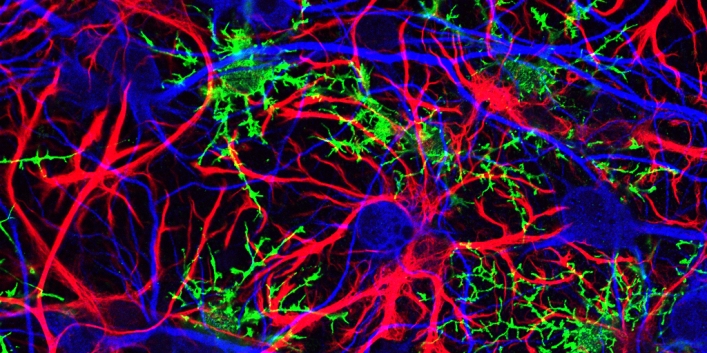
New Evidence Suggests Aging Brains Continue to Make New Neurons

Caption: Mammalian hippocampal tissue. Immunofluorescence microscopy showing neurons (blue) interacting with neural astrocytes (red) and oligodendrocytes (green).
Credit: Jonathan Cohen, Fields Lab, National Institute of Neurological Disorders and Stroke, NIH
Credit: Jonathan Cohen, Fields Lab, National Institute of Neurological Disorders and Stroke, NIH
There’s been considerable debate about whether the human brain has the capacity to make new neurons into adulthood. Now, a recently published study offers some compelling new evidence that’s the case. In fact, the latest findings suggest that a healthy person in his or her seventies may have about as many young neurons in a portion of the brain essential for learning and memory as a teenager does.
As reported in the journal Cell Stem Cell, researchers examined the brains of healthy people, aged 14 to 79, and found similar numbers of young neurons throughout adulthood [1]. Those young neurons persisted in older brains that showed other signs of decline, including a reduced ability to produce new blood vessels and form new neural connections. The researchers also found a smaller reserve of quiescent, or inactive, neural stem cells in a brain area known to support cognitive-emotional resilience, the ability to cope with and bounce back from stressful circumstances.
While more study is clearly needed, the findings suggest healthy elderly people may have more cognitive reserve than is commonly believed. However, the findings may also help to explain why even perfectly healthy older people often find it difficult to face new challenges, such as travel or even shopping at a different grocery store, that wouldn’t have fazed them earlier in life.
These latest findings come from the NIH-funded lab of Maura Boldrini at Columbia University, New York. The focus of Boldrini’s lab is on stem cell biology and neuroplasticity, the ability to learn and adapt, in the brains of people with treated and untreated mood disorders including depression.
While Boldrini and her colleagues hadn’t set out to study aging, they had access to an unusual collection of well-preserved brain samples representing a wide range of ages. It’s formally known as the Brain Collection of the New York State Psychiatric Institute at Columbia University. The autopsied tissue samples included the whole hippocampus, which is a region of the brain essential for learning and memory, of 28 women and men who died suddenly, primarily from trauma or a cardiovascular event. The brains were also fresh frozen within hours of death to ensure they were well preserved.
Boldrini and team later confirmed that none of the 28 had any history of neuropsychiatric disease or its treatment. They also screened the brain tissue to ensure it was free of 30 drugs that might impair normal brain function, including cocaine, amphetamines, selective serotonin re-uptake inhibitors (SSRIs), and many other drugs used to treat neuropsychiatric disorders. In fact, the new study is the first to explore the effects of aging on the whole hippocampi of people with a clear toxicology report and no neuropsychiatric disease.
The researchers examined the whole hippocampus, including its front, middle, and back. They were especially interested in the dentate gyrus, a part of the hippocampus associated with cognitive-emotional resilience and recalling memories, such as what a person ate for breakfast this morning. The dentate gyrus is also known for its ability to generate new neurons in adult animals, including laboratory mice.
In each region of the hippocampus, the researchers characterized and quantified angiogenesis (the formation of new blood vessels), tissue volume, and the number of cells, including neural stem cells, at various stages of maturity. For the cell counts, they relied on a gold standard method called stereology, which allows unbiased 3D estimates of cell numbers.
Overall, their studies showed no decline in the numbers of young neurons with age, suggesting that the healthy human brain keeps making new neurons throughout life. The hippocampi of elderly people had thousands of intermediate neural progenitor cells and dividing progenitor cells that produce other essential neural cells types, such as glial cells.
But there was also evidence that aging takes a toll on brain function. The hippocampi of older individuals showed less evidence that new neurons were successful in making new connections, the cellular basis for learning and memory. Older hippocampi also showed fewer newly formed blood vessels to support their new brain tissue.
Interestingly, the researchers also found a smaller pool of quiescent adult stem cells specifically in the front and mid-dentate gyrus of older compared to younger people. The researchers suggest that cognitive changes seen in healthy older people may stem primarily not from a generalized inability to generate new neurons, but from declines in specific brain areas associated with cognitive-emotional resilience.
This study is surely not the last word on the subject. Another recent report [2] came to a very different conclusion, and it will be important to understand these discrepancies. But if the current report is confirmed, it suggests that aging people may have plenty of new neurons to work with, given the right supports. The hope is that research findings like this might ultimately suggest new approaches, including lifestyle interventions or medications, to encourage healthy aging.
References:
[1] Human Hippocampal Neurogenesis Persists throughout Aging. Boldrini M, Fulmore CA, Tartt AN, Simeon LR, Pavlova I, Poposka V, Rosoklija GB, Stankov A, Arango V, Dwork AJ, Hen R, Mann JJ. Cell Stem Cell. 2018 Apr 5;22(4):589-599.e5
[2] Human hippocampal neurogenesis drops sharply in children to undetectable levels in adults. Sorrells SF, Paredes MF, Cebrian-Silla A, Sandoval K, Qi D, Kelley KW, James D, Mayer S, Chang J, Auguste KI, Chang EF, Gutierrez AJ, Kriegstein AR, Mathern GW, Oldham MC, Huang EJ, Garcia-Verdugo JM, Yang Z, Alvarez-Buylla A. Nature. 2018 Mar 15;555(7696):377-381.
Links:
How the Aging Brain Affects Thinking (National Institute on Aging/NIH)
Maura Boldrini (Columbia University, New York)
NIH Support: National Institute of Mental Health; National Institute of Neurological Disorders and Stroke






















.png)












No hay comentarios:
Publicar un comentario